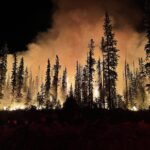
By: Rachel McIntyre
At 91 years old, William “Wild Bill” Yensen has earned a permanent place in wildland firefighting history—and now, a long-overdue honor to match.
On Sunday, the Wildland Firefighter Foundation presented Yensen with the prestigious Black Mountain Award during a surprise ceremony at his assisted living facility, recognizing a career that defied limits and redefined longevity in one of the world’s most demanding professions.
Yensen’s smokejumping legacy includes an astonishing 333 operational jumps over a career that spanned more than 30 years—from 1953 to 1986. Apart from a brief pause to serve in the U.S. Army, Yensen spent summers parachuting into remote wildfire zones across nearly every western state, often in terrain unreachable by road and under extreme conditions.
“I’m just blown away,” said Yensen, overcome with emotion. “To be able to keep jumping all those years—it meant everything to me.”
A Career That Stretched the Limits
Yensen began jumping in an era when the standard retirement age for smokejumpers was 40. But when regulations shifted to allow continued service for those who could pass the rigorous physical tests, he didn’t hesitate to return. He kept going for decades—pushing boundaries and setting new standards for toughness, skill, and commitment.
“Most people might do five years in this line of work. Ten is already exceptional,” said Eric Brocksome, who presented the award. “Wild Bill did three decades. That’s unheard of.”
Smokejumping: Elite and Unsung
Smokejumpers are often considered the elite within wildland firefighting—specially trained to parachute directly into inaccessible fire zones to stop wildfires before they grow out of control. They act quickly, often with minimal support, aiming to prevent small fires from becoming massive disasters.
“There’s maybe 300 or 400 of us nationwide during the peak season,” said Barry Koncinsky, a former smokejumper who served alongside Yensen. “We’d drop from as high as 1,500 feet. You’d get maybe eight seconds before you hit the ground. You needed every one of them.”
Koncinsky added, “Bill was one of the few people who lived and breathed the role. He taught school during the year and jumped fires every summer. It wasn’t just a job—it was his passion.”
A Moment to Remember
The award ceremony brought together family, fellow smokejumpers, and firefighting community members to pay tribute to a man who gave so much to the field. Emotions ran high as speakers reflected on Yensen’s remarkable impact.
“This wasn’t just about one man,” Brocksome noted. “It was about honoring a community of wildland firefighters who too often go unrecognized. They don’t get the spotlight—they’re in the backcountry, out of view, doing incredibly dangerous work.”
For Yensen, the recognition was deeply personal.
“It’s hard to step away,” he said. “Anyone who’s been a smokejumper knows—it gets in your blood. You love it.”





